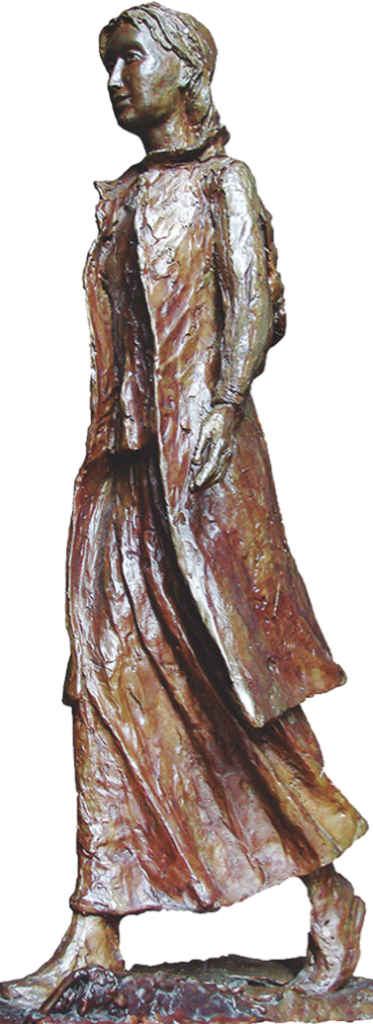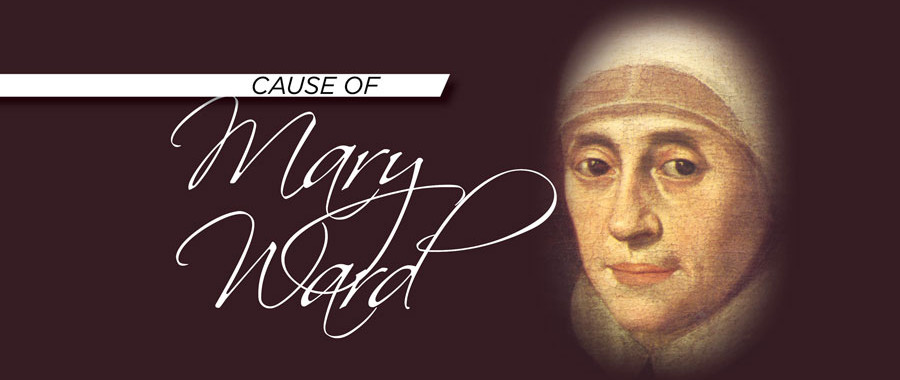Mary Ward
Over 400 years ago, Mary Ward, the founder of the Congregation of Jesus and the Institute of the Blessed Virgin Mary, was born into a world of turbulence. Mary spent her life following God’s guidance in seeking something new. She envisioned a religious community of women who were not cloistered, had no specific religious dress, and were free to bring God’s love wherever there was need. This is her story.
 Mary Ward was born into a Catholic family in Yorkshire, England in 1585. She grew up during the time when English Catholics were being persecuted for their faith. At fifteen, she felt called to become a religious and left England to join the Poor Clares. After one year, Mary learned God had other plans for her and she left the congregation. She worked in disguise to preserve the Catholic Faith before founding a community of active sisters in 1609 at St. Omer in present-day Belgium. Without cloister, she and her companions educated young women, helped persecuted Catholics, and spread the word of God in places priests could not go. The Sisters lived and worked openly on the continent, but secretly in England to nurture the faith.
Mary Ward was born into a Catholic family in Yorkshire, England in 1585. She grew up during the time when English Catholics were being persecuted for their faith. At fifteen, she felt called to become a religious and left England to join the Poor Clares. After one year, Mary learned God had other plans for her and she left the congregation. She worked in disguise to preserve the Catholic Faith before founding a community of active sisters in 1609 at St. Omer in present-day Belgium. Without cloister, she and her companions educated young women, helped persecuted Catholics, and spread the word of God in places priests could not go. The Sisters lived and worked openly on the continent, but secretly in England to nurture the faith.
In 1611, when at prayer, enlightenment came to her and she heard clearly the words: ‘take the same of the Society’ by which she understood the ‘Society of Jesus’ founded by St Ignatius of Loyola. The rest of her life was to be spent in developing a congregation of religious women on the Ignatian model for which she needed, and failed to gain, papal approval.
Suppression of the Congregation
Three times she and her companions walked to Rome from Flanders, twice to try to gain this approval and the third time as a prisoner of the Inquisition following the suppression of her congregation by Pope Urban VIII in 1631. During this period, she founded houses and schools in Belgium, Italy, Germany, Austria, in today’s Czech Republic and Slovakia and other places, often at the request of the local rulers and bishops.
She lived her fidelity with cheerfulness and a passion for truth
Many who knew her, admired her courage and generosity, but papal approval eluded her. Her efforts to expand the role of women in spreading the Catholic faith were criticized and maligned. Church officials called her a “dangerous heretic” and imprisoned her.
To the Papal authorities a congregation of apostolic, unenclosed women was conceptually a step too far at a time when the reforms of the Council of Trent had forbidden new religious congregations and confined religious women to enclosure. Had she been prepared to compromise and accept a form of enclosure Mary might have obtained papal approval. However, she would not compromise and preferred to face the dissolution of her congregation, imprisonment, the imputation of heresy, and disgrace rather than abandon her conviction that “there is no such difference between men and women that women in time to come will do much”.
Mary Ward died in York, England, in 1645 and was buried at Osbaldwick where her tombstone can still be seen. To the end, she trusted what God had asked of her would be accomplished in the future.
She invited her followers to “become lovers of truth and workers of justice”
She lived her fidelity with cheerfulness and a passion for truth. What may seem to us ordinary was startling in her time. Her concept of freedom for her community, externally from cloister, choir, habit, and rule by men, and internally in the ability to “refer all to God”, enabled her to live undeterred by adversity, never deviating from the way God called her. She invited her followers to “become lovers of truth and workers of justice.”
Recognition
Through the loyalty of her companions her Institute was kept alive and grew again, but it did not receive the definitive approval of the Church until 1877, or the acknowledgement of Mary Ward as Foundress until 1909. In 2009 she was declared Venerable and a woman of “heroic virtue”. The Cause for Venerable Mary Ward continues today.
The two branches founded by her are now working together towards the Union, as it was her desire.
Mary Ward was a pioneer for women’s role in Church ministry and a woman ahead of her time in shaping apostolic religious life as we know it today. Mary Ward expected much and believed with all her heart that, “Women in time to come will do much”.
